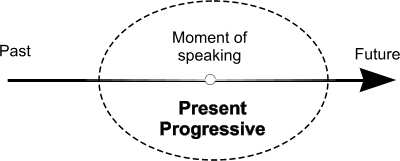Do you go away for the weekend?
I mean, do you sometimes go from your town to another place?

The present progressive puts emphasis on the course or duration of an action.

The present progressive is used for actions going on in the moment of speaking and for actions taking place only for a short period of time. It is also used to express development and actions that are arranged for the near future.
Present progressive is also known as present continuous.
Form:
| affirmative | negative | question | |
|---|---|---|---|
| I | I am playing. | I am not playing. | Am I playing? |
| he, she, it | He is playing. | He is not playing. | Is he playing? |
| you, we, they | You are playing. | You are not playing. | Are you playing? |
Let's watch these videos to achieve the objectives of learning related to present Continuous.
What are they doing?

 have fun
have fun play
do aerobics
clean up the house
write


Let's watch a video: http://smalltownenglish.com/
Adding -ing
| ||
Spelling Rule
|
Verb
(Base form)
|
Presentparticiple
|
Just add -ing to the end of the base verb and a stressed syllable: double the final consonant
|
work
play
open
run
|
working
playing
opening
running
|
consonant + vowel + consonant: double the final consonant
|
Stop
Begin
swim
|
stopping
beginning
swimming
|
consonant + -e: remove the -e
|
dance
make
|
dancing
making
|
-ie: change the -ie to -y
|
lie
die
|
lying
dying
|
Exceptions in Spelling
A single, silent e at the end of the word is dropped before ing.
example: come - coming
I am coming home. You are coming home. He is coming home.
I am coming home. You are coming home. He is coming home.
But: ee at the end of the word is not changed
example: agree - agreeing
The final consonant after a short, stressed vowel is doubled before ing.
example: sit - sitting
I am sitting on the sofa. You are sitting on the sofa. He is sitting on the sofa.
I am sitting on the sofa. You are sitting on the sofa. He is sitting on the sofa.
The letter l as final consonant after a vowel is always doubled before ing.
example: travel - travelling
I am travelling around. You are travelling around. He is travelling around.
I am travelling around. You are travelling around. He is travelling around.
Mind: This applies only for British English; in American English there is usually only one l.
An ie at the end of a word becomes y before ing.
example: lie - lying
I am lying in bed. You are lying in bed. He is lying in bed.
I am lying in bed. You are lying in bed. He is lying in bed.
The Present Continuous / Progressive

John is in his car. He is in his way to work.
He is driving to work This means he is driving now: “at the time of speaking” This is the present continuous. |
Write the question according to the answer.
1. ___________________________________? I am doing my homework.
2. ___________________________________? Yes, she is. She is having dinner in the kitchen.
3. ___________________________________? She is cooking dinner.
4. ___________________________________? They are playing their guitars in the backyard.
5. ___________________________________? No, I am not. I am studying.
6. ___________________________________? Yes, he is. He is working right now.
7. ___________________________________? Her students are studying different majors (careers)?
2. ___________________________________? Yes, she is. She is having dinner in the kitchen.
3. ___________________________________? She is cooking dinner.
4. ___________________________________? They are playing their guitars in the backyard.
5. ___________________________________? No, I am not. I am studying.
6. ___________________________________? Yes, he is. He is working right now.
7. ___________________________________? Her students are studying different majors (careers)?
WRITING. Imagine you are on the cell phone talking to someone. What are you talking about? What are you saying? What is the other person doing? Where is he/she? Is he/She at home? Write a dialogue. Use the vocabulary learned up to now as weel as the grammar and the different aspects.
Pam: ____________________________________________________________________
Sam: ____________________________________________________________________
Pam: ____________________________________________________________________
Sam: ____________________________________________________________________
Pam: ____________________________________________________________________
Sam: ____________________________________________________________________
Pam: ____________________________________________________________________
Sam: ____________________________________________________________________
Pam: ____________________________________________________________________
Sam: ____________________________________________________________________
- I_________________ (look for) my pen.
- Janet _____________ (print out) the contract in this moment .
- As long as I am on holiday, My grandparents ________________ (take care) of everything this weekend.
- Look! Graham _________________ (wear) a tie today.
- That’s because he _______________ (meet) the big boss in the afternoon.
- I ________________ (work/not) tomorrow.
- Bob ________________ ( not / talk) on the phone right now.
- ___________ you ___________ (read) a book this month?
- What _____ your sibling _________ these days?
- Where _______ Mister Bradley ______________ (stay) on his next vacation?
Use of Present Progressive
Present
Progressive is used for actions in the present and focusses on the course or
duration of the action.
§Action taking place now: Being in the middle of doing something at
the time of speaking.
Examples: Carla is preparing the briefing.
I am looking for Mister Miller’s phone number.
§
Action taking
place for a limited period of time only: Actions that don't take place regularly, but only temporarily.
Examples: Mister Thomson is on sick leave, that's why I am doing his
job.
Three temporary employees are helping out this month.
Three temporary employees are helping out this month.
§
Arrange future
actions: Future actions that are already arranged (and maybe
even jot down in a diary)
Examples: I am meeting Misses Walker at 5 pm.
Bob is doing overtime tomorrow.
Bob is doing overtime tomorrow.
SIGNAL
WORDS OF PRESENT PROGRESSIVE/ TIME EXPRESSIONS
|
||
ACTION
IN PROGRESS
|
TEMPORARY
SITUATIONS
|
FUTURE (arrangements)
|
at the moment
just
just now
Listen!
Look!
Now
Right now
|
these days
this weekend
this week
this month
this year
|
Tomorrow
The day after tomorrow
On Monday
Next week
In two days
Soon
In December
|








No comments:
Post a Comment